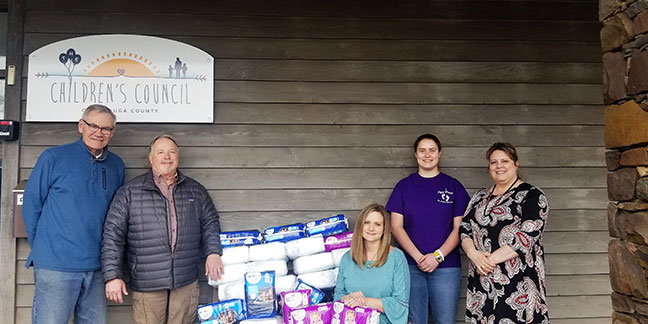 BOONE — Appalachian State student Clair Williams didn’t know the impact that a simple announcement at Mass could make.
BOONE — Appalachian State student Clair Williams didn’t know the impact that a simple announcement at Mass could make.
Williams, a senior music education major who is active in campus ministry and App State Students for Life, made an announcement about a diaper drive before Mass at her parish, St. Elizabeth.
“We were advertising at our church about the diaper drive and the need in the community, like we’ve done the past couple of years,” Williams said. “I found out that one of the members of the parish heard the announcement and knew who to call to make a major diaper donation happen.”
That parishioner was Jack Ryan, who retired to the Blue Ridge Mountains from Florida to be closer to his grandchildren. Ryan is also active in Knights of Columbus Council 11966.
Ryan had worked for 20 years in the coverting industry. In his experience, he knew that there is often product overruns and diapers with discontinued features that get discarded or recycled.
“I got on the phone, and I just got lucky,” Ryan explained. “I called someone at First Quality who I actually hired into the company, and they had five pallets of diapers they were willing to donate.”
First Quality Baby Products in Macon, Ga., donated about 30,000 diapers to Who Needs a Change? of the High Country, a project of the Children’s Council of Watauga County. The organization distributes diapers to families in need.
That total is almost half of the amount of diapers the diaper bank distributed last year, said Meggan Knight, program coordinator for Who Needs a Change? of the High Country and Children’s Council board member. Knight started the diaper bank in 2012 after being inspired by news coverage of a child with a maggot-invested diaper and learning about her community’s needs.
The diaper bank provides 50,000 to 80,000 diapers to children annually. Last year, they gave out 67,000 diapers, Knight said.
Knight helps solicit diapers for the community, and they are distributed through the Children’s Council.
This is the largest single donation the organization has ever received.
“We were very, very thankful for that,” Knight said. “It’s a sizable donation. We are excited about it.”
Ryan said the donation, which was delivered Jan. 21, included all different size diapers and training pants.
“I’m quite surprised by how this turned about,” Ryan said. “We provided about half of their yearly need in one transaction. I feel real good about being able to help when I can. You can’t predict what companies have to donate, if anything. It worked out this time.”
You never know who your words can reach.
“It’s incredible,” Williams said. “I didn’t believe it at first. I didn’t think that could even be possible. It feels amazing to know a simple announcement for our simple little club at App State could make a difference.”
Not counting the large donation, App State Students for Life collected more than 1,200 diapers and 1,200 wipes and more than 40 other bay items this year for their drive, up from around 500 the prior year, Williams said.
— Kimberly Bender, online reporter
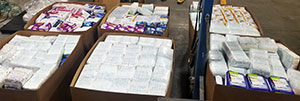
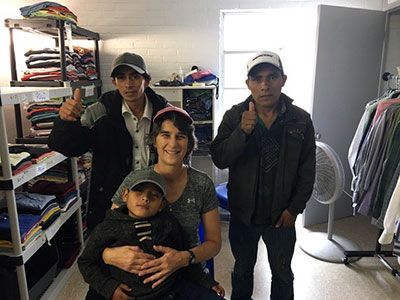 Cynthia Gibbs (center) is pictured in a borrowed pink cap, with a couple of the men who received baseball caps at the McAllen Humanitarian Respite Center in Texas. (Photos provided by Cynthia Gibbs)ASHEVILLE — The stories of many of the migrants Cynthia Gibbs encountered while volunteering in the border city of McAllen, Texas, touched her heart.
Cynthia Gibbs (center) is pictured in a borrowed pink cap, with a couple of the men who received baseball caps at the McAllen Humanitarian Respite Center in Texas. (Photos provided by Cynthia Gibbs)ASHEVILLE — The stories of many of the migrants Cynthia Gibbs encountered while volunteering in the border city of McAllen, Texas, touched her heart.
“I was helping a mom from Guatemala in the shoes room of the Catholic Charities-run McAllen Humanitarian Respite Center,” recalls Gibbs, a parishioner at St. Eugene Church. “I asked her if she had to cross the river since her own shoes were wet – how did she do it with her two girls, that were sitting near her, so quietly.
“She explained how she lifted and held on to her girls and showed me a bruise on her leg. Then she started sobbing and couldn’t stop. She had been traveling for four weeks, and I think she finally felt she and her daughters were safe. I hugged her, and she did not want to let go.”
For a month, Gibbs encountered hundreds of families a day while volunteering at the Respite Center, which provides temporary shelter for immigrants who cross from Mexico into the United States but who have been released by federal authorities.
The Respite Center’s goal is to restore human dignity to families, Gibbs says.
Gibbs, who in retirement remains active at her parish, was inspired to go to Texas after reading an email alert from the Sisters of Mercy South Central Justice in November. It said volunteers were needed at the border to assist with the overflow of immigrants, Gibbs explains. “This particular call to action hit me hard, and I could not stop thinking about it. I called Sister Rose Marie Tresp, and she helped me narrow down the choice of border cities looking for help to McAllen, Texas.”
The Respite Center is run by Sister Norma Pimentel, who has been praised by Pope Francis for her work with migrants. It helps immigrants – many of whom are seeking asylum and passing through the border city – have access to a shower, a clean change of clothes, a quick medical exam if needed, and a warm meal.
“I feel like I did not have a choice,” Gibbs says. “I was horrified when I learned that children were being separated from their parents at the border and the challenges these families faced. I finally had the opportunity to help and do something positive about it.”
Her husband Sam supported her call, and they paid for her airfare, hotel and car rental during her Jan. 8-Feb. 6 stay.
“I have a particular affinity for immigrants,” Gibbs explains. “My parents immigrated to this country from Italy. I also know some Spanish and have enjoyed working with the Hispanic community here at St. Eugene with tutoring and on St. Eugene’s Friendship Garden.”
Every day was different, Gibbs says. On her first day, she was given a tour of the facility – where the families enter the center; the room where a processor enters their data into a computer and the sponsoring family is contacted; the rooms used for sorting donations, the coats/sweaters room, the clothing rooms for children, men and women, the infant room full of diapers, powdered formula, clothes; the kitchen; the dining area; the room where sandwiches are made to give to the families as they leave; the rooms full of mats where the families sleep; the outdoor play area; the clinic; showers and bathrooms.
Instead of being assigned a station, Gibbs was allowed to choose where to help. She organized the women’s clothing room, then tackled the men’s clothing room.
“Since I received so many requests from the men and older teens at the center for baseball caps and belts, I put the word out that these items were sorely needed,” Gibbs says. “The following weeks, I can’t tell you how many boxes of donated baseball caps and belts were delivered to the center, but it was a lot! It was so much fun to distribute these.”
Besides helping stock the clothing rooms, Gibbs helped make snacks, assemble hygiene bags, translated for the nurse in the clinic and tied shoelaces together to be distributed.
“The biggest surprise for me was to find out that the border patrol confiscates everyone’s shoelaces, belts, baseball caps and wallets,” Gibbs says. “They all come to the center, young and old, without any shoelaces. Also, many of the adults are wearing ankle monitors and have to carry a shoebox-sized box with the charger for the ankle monitors.”
Something Gibbs wasn’t expecting was the gratitude she witnessed.
“I wasn’t expecting these exhausted, often traumatized families, to take the time to thank us volunteers,” she says. “I cannot tell you how many times I was told, ‘you are so kind,’ ‘God bless you’ and ‘thank you so much.’”
One man came back to the clothing room after his shower to show her how well his new clothes fit.
“He was all smiles,” Gibbs recalls. “I can still see that happy face.”
Small miracles and moments of grace like that happened every day, she says.
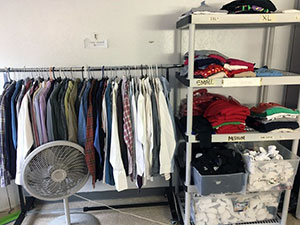
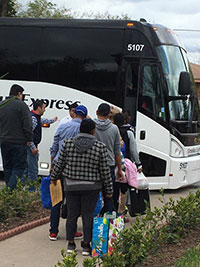
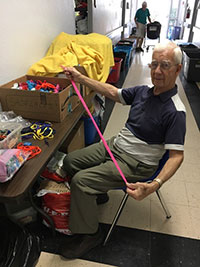 “On one of the last nights of my volunteer stint, I ran out of men’s socks. It broke my heart,” she says. “The next morning, after I had gotten the word out that I desperately needed men’s socks, one of the men I couldn’t help with socks the night before stopped by the clothing room to show me how the ankle monitor he was wearing was rubbing painfully against his skin. He asked if I had gotten in any more socks.
“On one of the last nights of my volunteer stint, I ran out of men’s socks. It broke my heart,” she says. “The next morning, after I had gotten the word out that I desperately needed men’s socks, one of the men I couldn’t help with socks the night before stopped by the clothing room to show me how the ankle monitor he was wearing was rubbing painfully against his skin. He asked if I had gotten in any more socks.
“At that moment, one of our ‘angel’ volunteers stopped by the room with bags of men’s socks. I watched as he put on the pair of socks, a grateful smile on his face.”
That’s just one of many little moments that left an impact on her.
One of the biggest challenges for her was when she fell ill with a sore throat and laryngitis.
“I couldn’t talk for six days,” Gibbs says. She had printed cards with answers to some common questions, but not everyone she came in contact with could read so not being able to communicate became an obstacle for her.
Another work of providence was the outpouring of prayers, support and donations from the St. Eugene Parish community, Gibbs notes.
Gibbs sent weekly email updates, and her Bible Study group decided to put together a donation box for the center. They collected 100 pounds of donations.
“It still brings tears to my eyes just thinking about the kindness and generosity of this group and all the others who donated sorely needed items,” she says.
The original Respite Center in the area opened in 2014, when Sister Pimentel saw an influx of immigrants arriving in Rio Grande Valley region. Out of a property that belonged to a local church, she and local volunteers began clothing and feeding the newcomers. Since then, respite centers at various temporary locations have helped thousands of migrants.
City leaders in McAllen voted in February to remove the Respite Center from its current location.
Sister Pimentel, executive director for the charitable agency running the temporary shelter in the Diocese of Brownsville, Texas, has won national and international praise for her work. She and the diocese are now trying to find a new location to continue the work of the Respite Center, and Catholic Charities of the Rio Grande Valley is raising money to build a permanent facility.
“These families could be you or me,” Gibbs says. “We could have been born in a country where it is impossible to earn enough money for our own family to survive, or where we are threatened with our lives or the lives of our children.
“One of the men at the center had a brother who was killed by a drug cartel and the cartel threatened him, too. What would we do to provide for our family or to keep them safe? The center families left so much behind to take a chance at a new life, at a new start. The families I saw and talked to have sacrificed much and are willing to work hard to make a new life for themselves.”
— Kimberly Bender, Online reporter
Want to help?
Donations of clothing, hats, belts, shoes, food, water bottles, toiletries and financial contributions are needed. Checks payable to Catholic Charities of the Rio Grande Valley should be mailed to Humanitarian Respite Center, c/o Catholic Charities of the Rio Grande Valley, 700 N. Virgen de San Juan Blvd., San Juan, TX 78589. Note “Humanitarian Center.”
Interested in volunteering?
A number of U.S.-Mexico border towns need volunteers. Contact Sister Rose Marie Tresp at This email address is being protected from spambots. You need JavaScript enabled to view it. or 956-324-7057.
To volunteer at the McAllen Humanitarian Respite Center, call Michelle Nuñez at 956-702-4088.
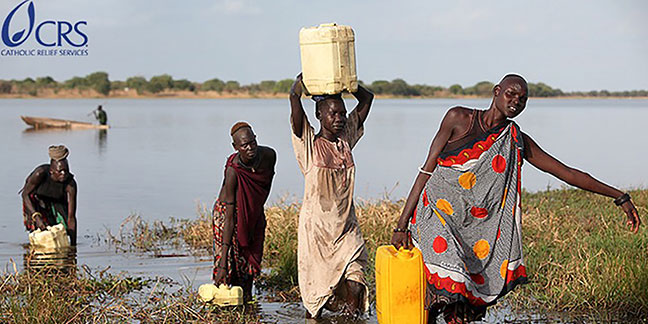 Water is essential to life, but for nearly a billion people access to clean freshwater is limited or non-existent.
Water is essential to life, but for nearly a billion people access to clean freshwater is limited or non-existent.
According to a February 2018 World Health Organization report (using 2015 global data), 71 percent of the global population (5.2 billion people) used a drinking-water service located on premises, available when needed, and free from contamination. An additional 18 percent of people had access to an improved water source located within a 30-minute round trip from their home, although this water was not necessarily free from contamination. However, an estimated 844 million people lacked even a basic drinking-water service – including 159 million people forced to access untreated surface water (such as rivers, streams and lakes) and 423 million people who had to obtain water from unprotected wells and springs.
Lack of access to clean freshwater leads to hundreds of thousands of deaths annually from waterborne illnesses, and countless millions of people spending days and weeks in agony fighting such illnesses.
Highlighting this problem is the intent of “World Water Day.” World Water Day has been internationally observed since 1993, with March 22 being the day officially assigned by the United Nations General Assembly for this observance.
Pope Francis has used this annual observance to join with other global leaders in calling for a world where all people have access to clean water for drinking, cooking and hygienic purposes, and enjoining the international community of nations to respect and promote access to clean water as an essential and fundamental human right.
This right has been espoused in Catholic social teaching, summarized as: “The right to water, as all human rights, finds its basis in human dignity and not in any kind of merely quantitative assessment that considers water as a merely economic good. Without water, life is threatened. Therefore, the right to safe drinking water is a universal and inalienable right” (excerpted from “The Compendium of the Social Doctrine of the Church,” Pontifical Council for Justice and Peace, 2004).
The varied themes of World Water Day each year guide nations and humanitarian agencies as they highlight the challenges faced by many around the earth to obtain clean freshwater and work for greater sustainable management of limited freshwater resources.
This year’s theme is “Leaving no one behind,” which echoes the Church’s “preferential option for the poor” as it calls upon the global community to consider people who have been marginalized and have restricted or no access to clean water. Women, children, older adults and those with disabilities often find their needs come last when the scramble for limited clean water pushes people to the periphery. For many people, access to clean water is denied because of discrimination, war and forced displacement or confinement.
In his message for this year’s World Water Day, Pope Francis reflected on the concern of those “left behind” in the access to clean water: “Water is an essential good for the balance of ecosystems and human survival, and it is necessary to manage it and take care of it so that it is not contaminated or lost. It may be seen in our days how the aridity of the planet is extending to new regions, and more and more are suffering as a result of the lack of water sources suitable for consumption. For this reason, ‘leaving no one behind’ means committing ourselves to putting an end to this injustice. Access to this good is a fundamental human right, which must be respected, because the life of the people and their dignity are at stake.”
His message continued: “Leaving no one behind also means being aware of the need to respond with concrete facts; not only with the maintenance or improvement of water structures, but also by investing in the future, educating new generations in the use and care of water. This task of raising awareness is a priority in a world in which everything is discarded and disdained, and which in many cases does not appreciate the importance of the resources we have at our disposal.”
Get involved
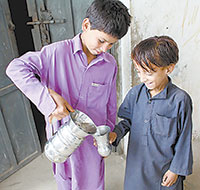 Two boys drink clean water made possible by a CRS project. After massive flooding destroyed water systems throughout northern Pakistan, CRS helped villagers construct or repair thousands of meters of pipeline.Catholics are able to join in supporting the yearly observance of World Water Day through their support of Catholic Relief Services, the U.S. Catholic community’s humanitarian relief and development agency sponsored by the U.S. bishops.
Two boys drink clean water made possible by a CRS project. After massive flooding destroyed water systems throughout northern Pakistan, CRS helped villagers construct or repair thousands of meters of pipeline.Catholics are able to join in supporting the yearly observance of World Water Day through their support of Catholic Relief Services, the U.S. Catholic community’s humanitarian relief and development agency sponsored by the U.S. bishops.
CRS serves vulnerable people oversees by developing and improving sources of clean water for drinking. cooking, washing, caring for livestock and irrigation.
In 2018, 7.2 million people benefited thanks to clean water and sanitation projects organized through CRS. CRS is also one of many humanitarian agencies calling for “a water secure world for all” by 2030.
Earlier this month, Thomas Awiapo, a CRS employee from Ghana, visited several schools in the Diocese of Charlotte and spoke of his childhood living in poverty, a childhood in which he was always close to starvation. He recounted how he had no choice but to drink from a nearby river. There he would see animals in the water, and though the river made people sick (and “some died from their sickness,” he lamented), there was no other choice. “I was thirsty,” Awiapo said.
With nutrition and education provided through CRS Rice Bowl-funded programs, Awiapo was raised out of destitution to eventually work for CRS. He now travels around the U.S. to express his gratitude to Catholics in America and share how Rice Bowl helps provide food and clean drinking water to vulnerable communities around the world.
— Joseph Purello, Special to the Catholic News Herald. Joseph Purello is director of Catholic Charities’ Office of Social Concerns and Advocacy and diocesan director for CRS.
Pictured: Women collect water from a river in Terakeka, Sudan. Villagers drink water from the river, which often results in stomach ailments and causes them to urinate blood. CRS constructed a borehole that provided enough fresh water for 500 families, or 2,500 people, for up to 50 years. In total, CRS will build 15 boreholes and repair another five in Terakeka. CRS will also train community members in hygiene promotion and water pump repair. (Photos provided by Catholic Relief Services)
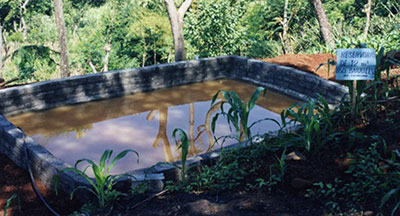 In El Salvador, this rain trap was used to collect water that can be used to water crops.
In El Salvador, this rain trap was used to collect water that can be used to water crops.

